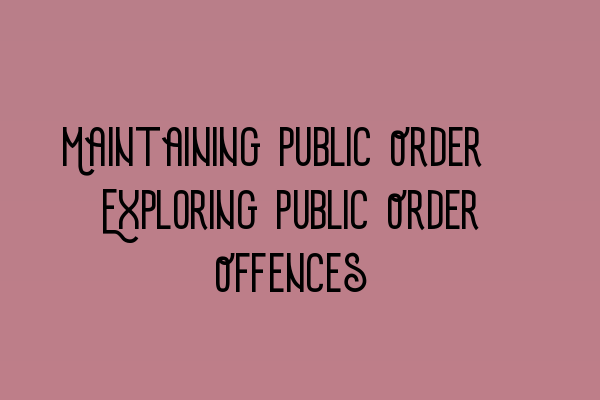Maintaining Public Order: Exploring Public Order Offences
Welcome to the SQE Criminal Law & Practice Law UK blog! In today’s post, we will delve into the intricacies of public order offences and the importance of maintaining public order. Public order offences are an essential aspect of criminal law, aiming to ensure the smooth functioning of society. Understanding these offences is crucial for aspiring solicitors preparing for the SQE exams.
Public order offences encompass a wide range of unlawful activities that disrupt public order, peace, and tranquility. These offences can take various forms, such as disorderly conduct, rioting, public nuisance, affray, and violent protests. It is imperative for solicitors to have a firm grasp of these offences to effectively represent their clients and protect the interests of justice.
The Impact of Public Order Offences
Public order offences can have significant consequences for individuals and the community as a whole. Disorderly conduct, for example, can lead to public disturbances, resulting in fear, injury, property damage, and disruption of daily life. Rioting, on the other hand, poses a serious threat to public safety and often requires immediate police intervention to restore order.
Understanding the impact of public order offences enables solicitors to analyze cases from different angles and develop effective strategies to handle them. It also empowers them to educate their clients about the gravity of such offences and the potential consequences they may face.
Investigating and Prosecuting Public Order Offences
Investigating and prosecuting public order offences can be complex, requiring meticulous attention to detail and an in-depth understanding of criminal law. Solicitors must thoroughly analyze the evidence against their clients, evaluate witness statements, and examine any available video footage or forensic evidence.
Effective defense strategies for public order offences often involve scrutinizing the legality of arrests, challenging the credibility of witnesses, and demonstrating the lack of intent or involvement of the accused. A well-prepared solicitor can make a significant difference in the outcome of a public order case, safeguarding the rights and reputation of their clients.
Impact on Sentencing
Public order offences can attract various penalties depending on the severity of the offence and the circumstances surrounding it. Factors such as previous convictions, the level of violence involved, and the impact on public safety will influence the sentencing process.
As solicitors, it is crucial to present compelling arguments in mitigation to achieve fair sentencing for clients convicted of public order offences. This may involve highlighting any extenuating circumstances, demonstrating the individual’s remorse, and presenting evidence of their good character or rehabilitation efforts.
Preparing for SQE Exams: Criminal Law and Public Order Offences
If you are pursuing a career as a solicitor and preparing for the SQE exams, it is essential to have a comprehensive understanding of criminal law, including public order offences. SQE 1 Practice Exam Questions and SQE 1 Practice Mocks FLK1 FLK2 are valuable resources that can help you test your knowledge and improve your exam performance.
To enhance your preparation, consider enrolling in SQE 2 Preparation Courses and SQE 1 Preparation Courses. These courses provide comprehensive study materials, expert guidance, and mock exams to help you develop the necessary skills and knowledge required to succeed in the SQE exams.
Stay informed about SRA SQE Exam Dates to plan your preparation effectively and ensure you are well-prepared for your exams. Remember, thorough preparation and a solid understanding of criminal law and public order offences are key to achieving success in the SQE exams and launching your career as a solicitor.
Thank you for reading our blog post on maintaining public order and exploring public order offences. We hope you found this information valuable. For more legal insights and exam preparation resources, visit the SQE Criminal Law & Practice Law UK website.
